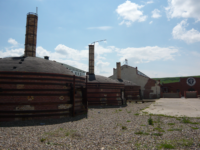SACPA gets a look at Hutterite life
By Toyin Obatusin - Lethbridge Herald Local Journalism Initiative Reporter on November 23, 2024.
The Wilson Hutterite Colony, although self-sufficient, supports small and local businesses in the Lethbridge community.
Thursday at the Southern Alberta Council on Public Affairs session hosted at the Lethbridge Senior Citizens Organization, had audiences sit in front of Mr. Henry Wurz, who is the colony’s German teacher, Ms. Claire Wurz, a member of the colony, and Mr. Gerry Walter of the Lomond Hutterite Colony, to discuss how diversification and self-sufficiency has kept the Wilson Hutterite Colony viable.
Founded in South Dakota in the U.S. then migrating to Canada in 1918, the colony has been made viable due to their own entrepreneurial abilities and diversification.
The citizens of the colony raise their own cattle, chickens and sheep, just to name a few, and although the colony has the means to make their own cheese, for example, they use the profit they make and reinvest it into Lethbridge and surrounding cities, including purchasing other varieties of cheese for themselves.
The colony uses the natural resources that they grow on their land like canola, corn, barley and peas to make money for their community. When farming equipment breaks down, male colony members, who have either been taught by the elders of the community, or who have been sent to school by the community, to work in mechanics, will be the community members who fix the farm equipment.
Men within the colony only go to school until grade nine. Once they turn 15, they go and work on the farm and are given a field boss to manage them. They call this hand craft work and livestock work, also known as farm work.
Hand craft work is what they call a “life job” – this might be becoming a welder or a leathersmiths, farmer, etc. They try to move their boys around so that they’re hands on in multiple positions within the colony.
Positions include working in the feedlot, chicken barn, with the pigs, or in dairy. Once the colony has ensured that a boy is not only old enough, but is also responsible enough, they can now use him as a manager in that specific position and/or industry.
If they see potential in any of their community members, they will send them to either the University of Lethbridge or the Lethbridge Polytechnic to encourage them to master their craft.
Around the age of 20, before marriage, a female will be baptized if she requests for it. Without being baptized, the girls are not able to marry. After baptism, she will receive her own bedroom suite with furniture that she will take with her to her husband’s colony, and a sewing machine.
Everything that the couple would need for a house is gifted to the woman prior to the marriage. They will receive a table with six chairs, a bed, a dresser and a wall clock, and learn how to cook in their community kitchen, where the women take turns cooking different meals for everyone in the colony, where they eat in a communal setting. This is the first step to teaching women skills that will enhance their home.
The colony creates their own clothing, leather gloves, insoles for shoes and horse saddles. There is also a woodworking shop where the carpenters work. “We try to be self sufficient, as far as making our own furniture, everything we try and do ourselves,” Henry Wurz told the audience.
“Our kitchen cabinets, or our tables and chairs, the bedroom suites, so anything really, we try to do it on our own. That’s our biggest thing is fixing stuff. We even do a lot of custom work”.
Many Lethbridge civilians visit the colony to make purchases for things like custom furniture, cabinetry, poultry and dairy, leather and so much more.
The colony welcomes visitors that would like to view their culture.
16-15



